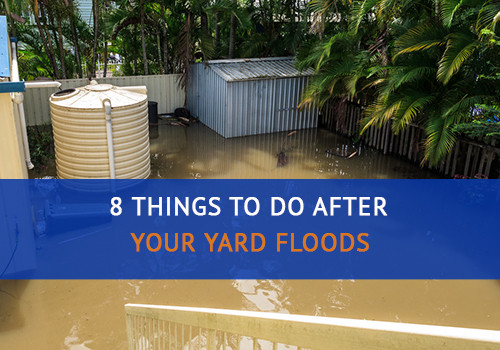Florida’s rainy season is right now, and it’ll last until October. So let’s get ready to weather the storm for a couple of more months that way you know what to do if your home and yard floods.
Florida is vulnerable to flooding with tropical storms, hurricanes, and almost nightly thunderstorms. When flooding happens the first thing you think about is your house. If you’re a homeowner with a septic system, you also need to prepare for if your yard floods.
Unfortunately, there isn’t much that you can do to prevent flooding, but there are things that you can do in the aftermath of a bad storm to ensure the health of your septic system. Let’s discuss what you, as a septic system owner, need to remember after the storm has lifted.

8 Things to Do After Your Yard Floods – Septic System Addition
1. Wait to drink the water.
Before drinking water from your house system, you should test it for safety. If you drink from a well, then you want to take extra precautions in making sure the water is potable. You can do this by calling the local health department.
In fact, the department of health has compiled a series of “After Storm Safety” tips in a handy file on their website. These tips include topics on personal hygiene, sanitation, food, and the surrounding environment. Since we’re focused on the septic system, take a look to review a broader list of safety tips to consider after a storm.
2. Avoid using your septic system until you know it’s dry.
You want to wait to use your septic system after your yard floods until standing water in your drain field recedes. During flooding, the water in the drain field cannot reabsorb into the ground, causing your system to back up.
3. Keep children and animals away.
Keeping a safe distance from the septic system can help you avoid contact with contaminated water. It’s essential to wait until you’ve had an inspection and the flood water has receded – which leads us to our next safety tip.
4. Schedule an inspection.
Make sure to schedule a proper inspection with your trusted septic professionals directly after or during flooding. Although doing the check yourself may sound easy, it’s never safe to open your septic tank or interfere with your drain field.
A professional can diagnose your septic needs efficiently and cost-effectively. They can tell you whether your septic tank needs to be pumped or if the drain field is good to go. When it comes to your and your family’s health, don’t skip going the extra step for a proper inspection.
5. Be mindful when cleaning up floodwater.
After your yard floods, do not clean up flood water by putting it down the drain. Remember that all of your household wastewater travels through the septic system, and therefore will only flood your septic system even more.
Err on the side of caution when cleaning up. Floodwater can hide debris and holes. Always, make sure to wash your hands after handling floodwater; it can be contaminated.
6. Divert rainwater away from the septic system.
If you can prevent more water from entering your septic system during a flood, do it! It’s easy. Check your rain gutters and drains to see where they empty runoff water. If you can tell that the runoff will add a heavier load to your system, go ahead and redirect the flow.
If you know a big storm is rolling through, it’s a good idea to check your gutters and drains preemptively.
7. Conserve water.
While waiting for your property to dry out, conserve the water you use daily. Remember that all household wastewater drains into your septic system. Practicing lessening your water consumption will reduce the load on your septic system and therefore allow the proper time for the soil to dry. The less water you use, the better it is for your property.
8. Do not drive over your septic system.
Although it’s never a good idea to drive over your septic system, this is especially true after flooding. The soil is moist and will compact easily under pressure. Putting extra weight on top of the system can break components or damage your drain field. Compacting the ground in the drain field can reduce its ability to absorb water.
Flooding is difficult to deal with, especially as a septic system owner. We don’t want your septic system to be the bulk of your worries. Let us help you with septic system maintenance and repairs after your yard floods. Give us a call at (352) 242-6100 or pay us a visit at Advanced Septic Services.

